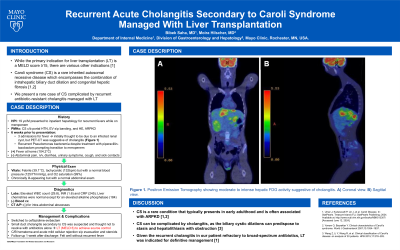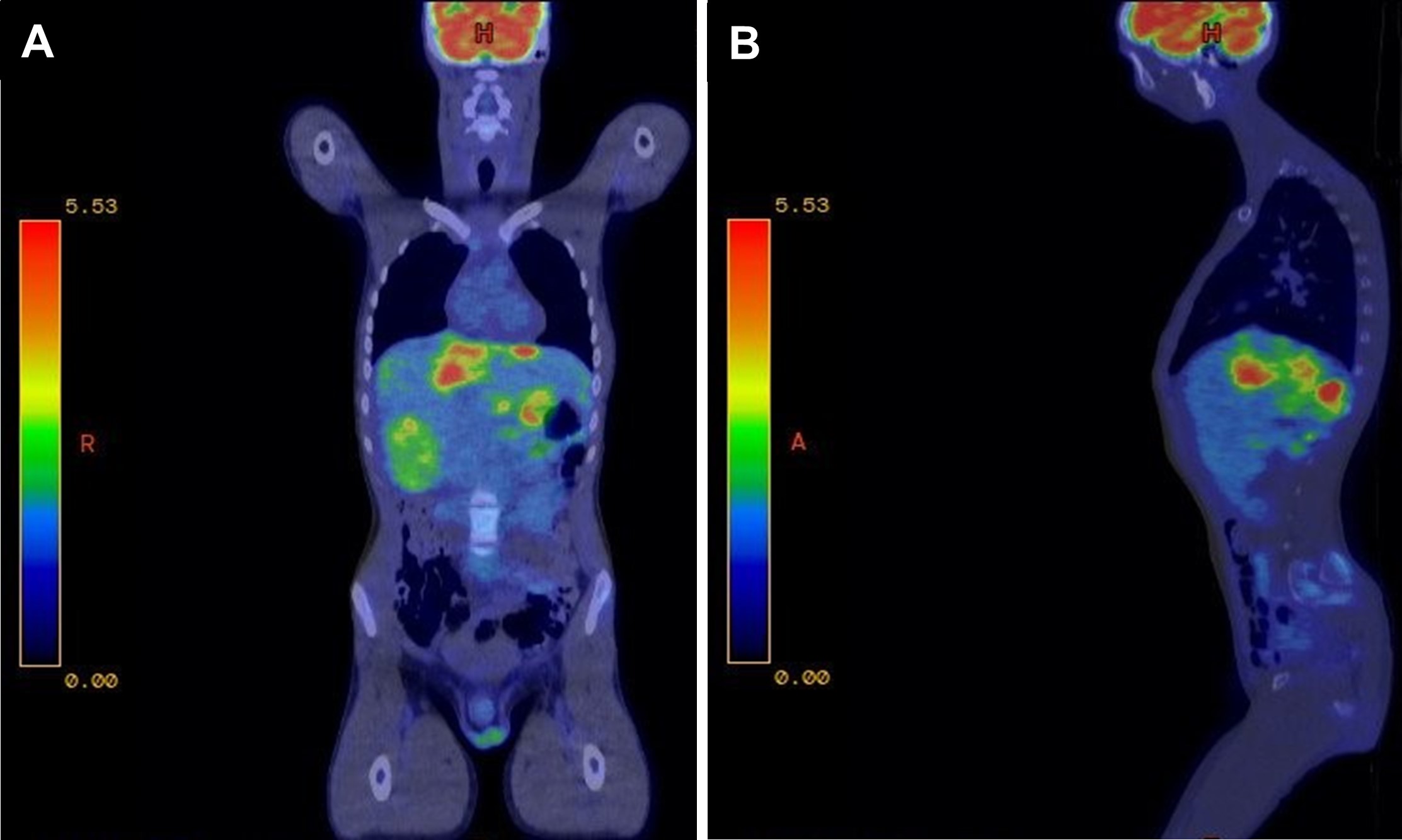Monday Poster Session
Category: Liver
P2982 - Recurrent Acute Cholangitis Secondary to Caroli Syndrome Managed With Liver Transplantation
Monday, October 28, 2024
10:30 AM - 4:00 PM ET
Location: Exhibit Hall E

Has Audio

Bibek Saha, MD
Mayo Clinic
Rochester, MN
Presenting Author(s)
Bibek Saha, MD, Moira Hilscher, MD
Mayo Clinic, Rochester, MN
Introduction: While the primary indication for liver transplantation (LT) is a MELD score ≥15, there are various other indications. Caroli syndrome (CS) is a rare inherited autosomal recessive disease which encompasses the combination of intrahepatic biliary duct dilation and congenital hepatic fibrosis. We present a rare case of CS complicated by recurrent antibiotic-resistant cholangitis managed with LT.
Case Description/Methods: A 19-year-old male with a history of autosomal recessive polycystic kidney disease (ARPKD), and CS complicated by portal hypertension, esophageal varices managed with banding, and hepatic encephalopathy presented to inpatient hepatology for recurrent fevers while on meropenem.
In the 6 weeks prior to presentation, he had 3 admissions for fever. This was initially thought to be due to an infected renal cyst, but PET-CT was suggestive of cholangitis (Figure 1). During these admissions, he was found to have recurrent Pseudomonas bacteremia and this recurred despite treatment with piperacillin-tazobactam prompting transition to meropenem. However, the patient represented due to a fever of 104.2°C at home while on meropenem. He denied any abdominal pain, nausea, emesis, diarrhea, urinary symptoms, cough, and sick contacts.
On presentation, he was febrile (39.1°C), tachycardic (132bpm) but with a normal blood pressure (125/77mmHg), and O2 saturation (99%). On physical exam, he was chronically ill-appearing but with a normal abdominal exam. Labs revealed a WBC count of 29.8. INR was 1.6 and CRP was 245. Liver chemistries were normal with the exception of an elevated alkaline phosphatase (184). Blood cultures were negative. CT of the abdomen and pelvis did not show intra-abdominal abscesses.
He was switched to ceftazidime-avibactam. It was thought that the small duct cholangitis secondary to CS may not resolve with antibiotics alone prompting LT (MELD 6) to achieve source control. This was complicated by hematoma formation and acute mild cellular rejection managed with hematoma evacuation and steroids, respectively. On follow-up 1-week after discharge, he felt well without recurrent fever.
Discussion: CS is a rare condition that typically presents in early adulthood and is often associated with ARPKD. CS can be complicated by cholangitis, as the biliary cystic dilations can predispose to stasis and hepatolithiasis with obstruction. Given the recurrent cholangitis in our patient refractory to broad-spectrum antibiotics, LT was indicated for definitive management.

Disclosures:
Bibek Saha, MD, Moira Hilscher, MD. P2982 - Recurrent Acute Cholangitis Secondary to Caroli Syndrome Managed With Liver Transplantation, ACG 2024 Annual Scientific Meeting Abstracts. Philadelphia, PA: American College of Gastroenterology.
Mayo Clinic, Rochester, MN
Introduction: While the primary indication for liver transplantation (LT) is a MELD score ≥15, there are various other indications. Caroli syndrome (CS) is a rare inherited autosomal recessive disease which encompasses the combination of intrahepatic biliary duct dilation and congenital hepatic fibrosis. We present a rare case of CS complicated by recurrent antibiotic-resistant cholangitis managed with LT.
Case Description/Methods: A 19-year-old male with a history of autosomal recessive polycystic kidney disease (ARPKD), and CS complicated by portal hypertension, esophageal varices managed with banding, and hepatic encephalopathy presented to inpatient hepatology for recurrent fevers while on meropenem.
In the 6 weeks prior to presentation, he had 3 admissions for fever. This was initially thought to be due to an infected renal cyst, but PET-CT was suggestive of cholangitis (Figure 1). During these admissions, he was found to have recurrent Pseudomonas bacteremia and this recurred despite treatment with piperacillin-tazobactam prompting transition to meropenem. However, the patient represented due to a fever of 104.2°C at home while on meropenem. He denied any abdominal pain, nausea, emesis, diarrhea, urinary symptoms, cough, and sick contacts.
On presentation, he was febrile (39.1°C), tachycardic (132bpm) but with a normal blood pressure (125/77mmHg), and O2 saturation (99%). On physical exam, he was chronically ill-appearing but with a normal abdominal exam. Labs revealed a WBC count of 29.8. INR was 1.6 and CRP was 245. Liver chemistries were normal with the exception of an elevated alkaline phosphatase (184). Blood cultures were negative. CT of the abdomen and pelvis did not show intra-abdominal abscesses.
He was switched to ceftazidime-avibactam. It was thought that the small duct cholangitis secondary to CS may not resolve with antibiotics alone prompting LT (MELD 6) to achieve source control. This was complicated by hematoma formation and acute mild cellular rejection managed with hematoma evacuation and steroids, respectively. On follow-up 1-week after discharge, he felt well without recurrent fever.
Discussion: CS is a rare condition that typically presents in early adulthood and is often associated with ARPKD. CS can be complicated by cholangitis, as the biliary cystic dilations can predispose to stasis and hepatolithiasis with obstruction. Given the recurrent cholangitis in our patient refractory to broad-spectrum antibiotics, LT was indicated for definitive management.

Figure: Figure 1. Positron Emission Tomography showing moderate to intense hepatic FDG activity suggestive of cholangitis. A) Coronal view. B) Sagittal view.
Disclosures:
Bibek Saha indicated no relevant financial relationships.
Moira Hilscher indicated no relevant financial relationships.
Bibek Saha, MD, Moira Hilscher, MD. P2982 - Recurrent Acute Cholangitis Secondary to Caroli Syndrome Managed With Liver Transplantation, ACG 2024 Annual Scientific Meeting Abstracts. Philadelphia, PA: American College of Gastroenterology.
